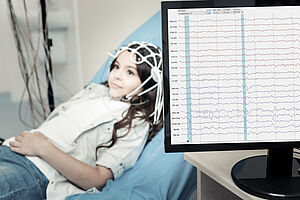The Medical Signal Analysis Team of the AIT Center for Health and Bioresources, together with medical and technical partners Kepler Universitätsklinikum GmbH, TeleDoc Holding GmbH, g.tec medical engineering GmbH, INFORMATICS Healthcare GmbH, and Symptoma GmbH, has received FFG funding in the amount of 500,000 euros to develop a decision support system for the diagnosis and treatment of epilepsy in young patients. This system is based on AI-based algorithms and will automatically detect and display epileptic brain activity in children and adolescents.
Epilepsy is one of the leading causes of disability worldwide and the risk of premature death in people with epilepsy is up to three times higher than in the general population. With around 50 million people affected and annual costs of around 119.27 billion dollars, the burden is constantly increasing. The WHO points out that up to 70% of epilepsy patients could become seizure-free if diagnosed and treated in time. For children, untreated epilepsy can have particularly serious consequences. Each seizure can cause not only the loss of nerve cells in young people, but also developmental delays and regressions that affect learning and memory skills for the rest of their lives. Long-term EEG recording is required for accurate diagnosis and subsequent treatment, but visual evaluation of such data is a time-consuming process that requires expert knowledge. Therefore, the need for a more efficient and accurate solution is clear.
EpiCare4Kids
Together with Kepler Universitätsklinikum GmbH, TeleDoc Holding GmbH, g.tec medical engineering GmbH, INFORMATICS Healthcare GmbH, and Symptoma GmbH, the team has set itself the goal of using the advantages of artificial intelligence to improve the diagnosis and treatment of childhood epilepsy. „In the project, we will develop a decision support system that is specifically tailored to children and adolescents with epilepsy. By using Deep Neural Networks (DNN), algorithms will be developed that can automatically distinguish between healthy and epileptic brain activity in children. As a result, physicians will be able to obtain a comprehensive overview of brain activity patterns within minutes, with precise indication of when epileptic events such as spikes or seizures occurred," explains project leader Malgorzata Wislowska, Scientist in the Competence Unit Medical Signal Analysis
Large amounts of annotated data are used to teach the DNN to recognize characteristic features of epileptic events and to optimize its algorithms for sensitivity and specificity. In addition, the algorithms are trained to distinguish between real brain signals and interference from muscles, eye movements or electrodes, a common challenge in pediatric EEG recordings.
encevis
The team already has many years of experience and an impressive track record. Their software "encevis" automatically analyzes and visualizes epileptic brain activity in adult EEG data with a detection sensitivity of up to 95% for seizures, 85% for spikes and 90% for burst suppression patterns. encevis is approved as a class IIb medical device in Europe and the US. The interdisciplinary team consists of software developers, AI algorithm experts, regulatory affairs professionals and seasoned scientists with extensive experience in analyzing biosignals. In the EpiCare4Kids project, the encevis team will work on developing the solution that will support young patients, just as encevis has been supporting adult patients for many years.
Certification as a medical device
The project aims to achieve certification as a medical device so that the software can be available as an important tool for healthcare professionals working with childhood epilepsy, particularly in intensive care units and epilepsy monitoring units. Faster diagnoses and treatment plans, potentially saving young patients from developmental delays and life-changing consequences.
Wislowska is convinced: "This not only helps patients and their families, but also reduces the burden on the healthcare system, which has to deal with the consequences of delayed epilepsy diagnoses." The future of childhood epilepsy diagnosis is more hopeful than ever thanks to the combination of medical expertise and cutting-edge AI technology.
More: www.encevis.com



